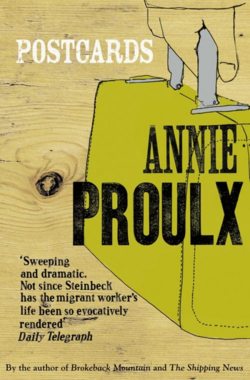Читать книгу Postcards - Annie Proulx, Энни Пру - Страница 13
5 A Short, Sharp Shock
ОглавлениеTHE BEAR, LIKE MANY BEARS, had led a brief and vivid life. Born in the late winter of 1918 in a stump den, he was the oldest of two cubs. In personality he was quarrelsome and insensitive to the subtle implications of new things. He ate the remains of a poisoned eagle and nearly died. In his second autumn, from the height of a cliff, he saw his mother and sister backed against an angle in the rock by lean bear hounds. They went down in squalling that drew nothing but dry rifle fire. He was hunted himself the same year but escaped death and injury until 1922 when a coffin maker’s charge of broken screws swept up from the shop floor smashed his upper left canine teeth, leaving him unbalanced in mind and with chronic abscesses.
The next summer McCurdy’s Lodge, a massive structure of dovetailed spruce logs and carved cedar posts, opened on the eastern side of his range. The bear’s sense of smell was sharpened by hunger. He came to the Lodge’s garbage dump and its exotic peach peelings, buttered crusts and beef fat that melted in his hot throat. He began to lurk impatiently in the late afternoon trees for the cook’s helper with his wheelbarrow of orange peel and moldy potatoes, celery stumps and chicken bones, trickles of sardine oil.
The helper was a lumber-camp cook learning the refinements of carriage trade cuisine. He saw the bear in the dusk and ran shouting up to the Lodge for a ride. Hotelier McCurdy was in the kitchen talking Toumedos forestier with the cook and went to look at the bear for himself. He saw something in the hulking shoulders, the doggy snout, and told the Lodge carpenters to build benches on the slope above the dump. They set the area off with a peeled sapling railing to mark the limits of approach. The bolder guests walked twittering through the birches to see the bear. They touched each other’s shoulders and arms, their hands sprang protectively to their throats. The laughter was choked. The bear never looked up.
Through the summer the guests watched the bear flay the soft, fly-spangled garbage with his claws. The men wore walking suits or flannel bags and argyle pullovers, the women came in wrinkled linen tubes with sailor collars. They lifted their Kodaks, freezing the sheen of his fur, his polished claws. Oscar Untergans, a timber-lot surveyor who sold hundreds of nature shots to postcard printers photographed the bear at the summer dump. Untergans came again and again, walking along the path behind the cook, picking up any fetid rinds or dull eggshells thrown from the jouncing wheelbarrow. Sometimes the bear was waiting. The cook pitched the garbage with a pointed spade. He hit the bear with rotted tomatoes, grapefruit halves like yellow skullcaps.
Two or three summers after Untergans snapped the bear’s image they ran electric line to the Lodge. One evening the bear did not appear at the dump, nor was he seen in the following weeks and years. The Lodge burned on New Year’s Eve of 1934. On a rainy May night in 1938 Oscar Untergans fell in his estranged wife’s bathroom and died from a subdural haematoma. The postcard endured.
